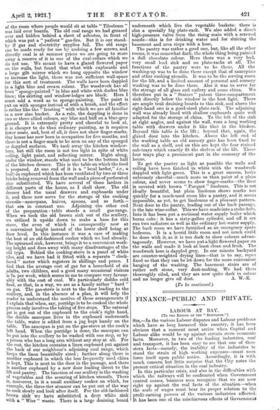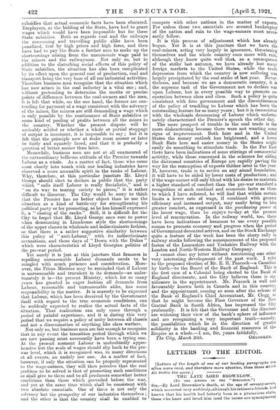FINANCE—PUBLIC AND PRIVATE.
LABOUR AT BAY.
[To THE EDITOR or THE " SPECTATOR."] Srn,—In the various Labour disputes and Labour problems which have so long harassed this country, it has been obvious that a moment must arrive when Capital and Labour alike would be up against certain stern economic facts. Moreover, in two of the leading industries, coal and transport, it has been easy to see that one of these stern facts—namely, the inability of the industries to stand the strain of high working expenses—must soon force itself upon public notice. Accordingly, it is with much concern but little surprise that the City notes the present critical situation in the coal industry. In this particular crisis, and also in the difficulties with which the railways will be confronted when Government control ceases, business men recognize that we are now right up against the real facts of the situation—when the scale of wages must bear its proper relation to the profit-earning powers of the various industries affected. It has been one of the mischievous effects of Government . penalized, first by high prices and high fares, and then begun. Yet it is at this juncture that we have the have had to pay the State a further sum to make up the coal-miners, acting very largely in . ignorance, threatening shortcomings arising from the uneconomic wage paid to themselves and the whole country once more with ruin, the miners and the railwaymen. Not only so, but in although they know quite well that, as - a consequence addition to the disturbing social effects of this policy of of the strike last autumn, we have already lost many State subsidies, the situation has also been complicated foreign markets to the United States, while the trade by its effect upon the general cost of production, coal and depression from which the country is now suffering was transport being the very base of all our industrial activities. largely precipitated by the coal strike of last year. Never- Therefore business men recognize that the situation which thelesss, and because we are a democratic country, it is has now arisen in the coal industry is a vital one ; and, the supreme task of the Government not to declare war without pretending to determine the merits or precise upon. Labour, but in every 'possible way to promote co. points of difference between the coal-owners and the men, operation between .class and class. Such a policy is quite it is felt that while, on the one hand, the former are con- consistent with firm government and the discontinuance tending for payment of a wage consistent with the solvency of the policy of truckling to Labour which has been the of the mines, the miners are still demanding a wage which outstanding feature for so many years but it is inconsistent is only possible by the continuance of State subsidies or with the wholesale denouncing of Labour which unfortu. some kind of pooling of profits between all the mines in nately characterized, the Premier's speech the other day. the country. Whether the present dispute will be The mere prospect of trouble in the coal trade is the amicably settled or whether a whole or partial stoppage more disheartening because there were not wanting some of output is imminent, it is impossible to say ; but it is signs of improvement. Both here and in the United felt that the principle now at stake must sooner or later States the money outlook las brightened, and a lower be fairly and squarely faced, and that it is probably a Bank Rate here and easier money in the' States might question of better sooner than later. easily do something to stimulate .trade. In the, Far East Meanwhile, business men are not at all enamoured of there have been.indications of some stirrings of commercial the extraordinary bellicose attitude of the Premier towards activity, while those concerned in the schemes for aiding Labour as a whole. As a matter of fact, those who come the distressed countries of Europe are rapidly paving the most closely into touch with our leading industries have way for the resumption of exports thither later in the year. observed a more amenable spirit in the ranks of. Labour. If, however, trade is to revive on any sound foundation, Why, therefore, at this particular juncture Mr. Lloyd it will have to be aided by lower costs of production ; and George should elect to declare in public that the_ party if the-wage-earner will only blend with his desire to maintain a which " calls itself Labour is really Socialistic," and is . a. higher standard of comfort _than the pre-war standard a on its way to tearing society topieces," it is rather recognition of such cardinal and economic facts as those difficult to discover. The City would be sorry to think to which I have .referred, he will' find that within certain that the Premier has no better object than to use the limits a lower rate of wage, if combined with greater situation as a kind of battle-cry for strengthening his efficiency and increased output, may easily bring to him political party or for promoting, as he has himself expressed greater comfort, as expressed in the, purchasing power of it, a " closing of the ranks." Still, it is difficult for the the lower wage, than he enjoys to.-d.ay.at the present City to forget that Mr. Lloyd George once rose to power level of remuneration. In the railway world, too, there when denouncing in Limehouse style the shortcomings have been indications of keenness to use every possible of the upper classes in wholesale and indiscriminate fashion, means to promote economy and progress when the period so that there is a rather suggestive similarity between of Government decontrol arrives, and on the Stock Exchange this policy of " anti-Labour," with . its indiscriminate quite . a feature of the week has been the sharp. rally in accusations, and those days of " Down with the Dukes " railway stocks following the announcement of the proposed which were characteristics of Lloyd Georgian politics of .fusion of the Lancashire and Yorkshire Railway with the the pre-war period. ..London and North-Western Railway Company. Yet surely it is just at this juncture that firmness in _I cannot close my letter without mentioning one other repelling unreasonable Labour demands needs to be -very interesting development of the past week. I refer mingled with much patience and consideration. More- to the proposed election of Mr. E. R.-.Peacock,a Canadian over, the Prime Minister may be reminded that if Labour . by birth—to the Board of the Bank of England. This is is unreasonable and truculent in its demands—as unfor- the first case of a Colonial being elected to the Bank of tunately it is—the present Ministry, which • for so many England directorate, , and the City believes there is sig- years has granted in eager fashion all demands from nificance in the appointment. _Mr.: Peacock is well and Labour, reasonable and unreasonable alike, has some .favourably known both in Canada and in this country, responsibility in the matter. It is scarcely to be expected ..and the appointment, coming so soon: after the release of that Labour, which has been deceived by the Government the Bank of England's Chief Accountant, 'Mr. Clegg, se itself with regard to the true economic conditions, can that he might become the First Governor of the New be suddenly expected to realize the actual facts of the Central Bank in South Africa, has impressed the City situation. That realization can only come through a profoundly. It is felt that the Governor and the directors period of painful experience, and it is during this very are widening their view of the bank's sphere of influence period that we require a policy of unity between. all classes and are recognizing, a very important . truth—namely, and not a dissemination of anything like class warfare. .the possibilities which lie in the direction of greater Not only so, but business men are fair.enough to recognize solidarity in the banking and financial resources _ of the that in any event the transition period through which we Empire as a whole.—I. am, . Sir, yours faithfully, are now passing must necessarily have been. a trying one. The. City, March .30th. ONLOOKER. At the present moment Labour is undoubtedly appre- hensive lest •the scale of wages should slip back to the pre- war level, -which it is recognized was, in many directions LETTERS TO THE 1EDITOR. at all events, an unduly low one. • As a matter of fact, however, if only the situation can be properly represented then to the wage-earners, they will 'perceive that the real [Letters of the length of one of our leading paragraphs are problem to be solved is that of promoting such conditions often moreread, and therefore more effective, than those which as shall give to 'them and to all producers somewhat better THE .LATE LORD BROWNLOW. conditions than those which prevailed before the war, LTo THE EDITOR OF THE "SPECTATOR."' and yet at the same time which shall be consistent with SIR,—By Lord Hrownlow's death, at the age of -seventy-seven, two absolute essentials. One of these is not only the which occurred very auddenly,although his intimate friends had solvency but the prosperity of our industries themselves ; known that his health had latterly been in a precarious state, and the other is that the country shall be enabled to those who knew and loved him (and the terms are-synonymous) subsidies that actual economic facts have been obscured. 'compete with other nations in the matter of exports. Employers, at the bidding of the State, have had to grant For unless those two essentials are - secured bankruptcy wages which would have been impossible but for these of the nation and ruin to the wage-earners must neces- State subsidies. Both as regards coal and the railways sarily follow. the consuming and travelling public alike have been It is this process of adjustment which • has already



































 Previous page
Previous page